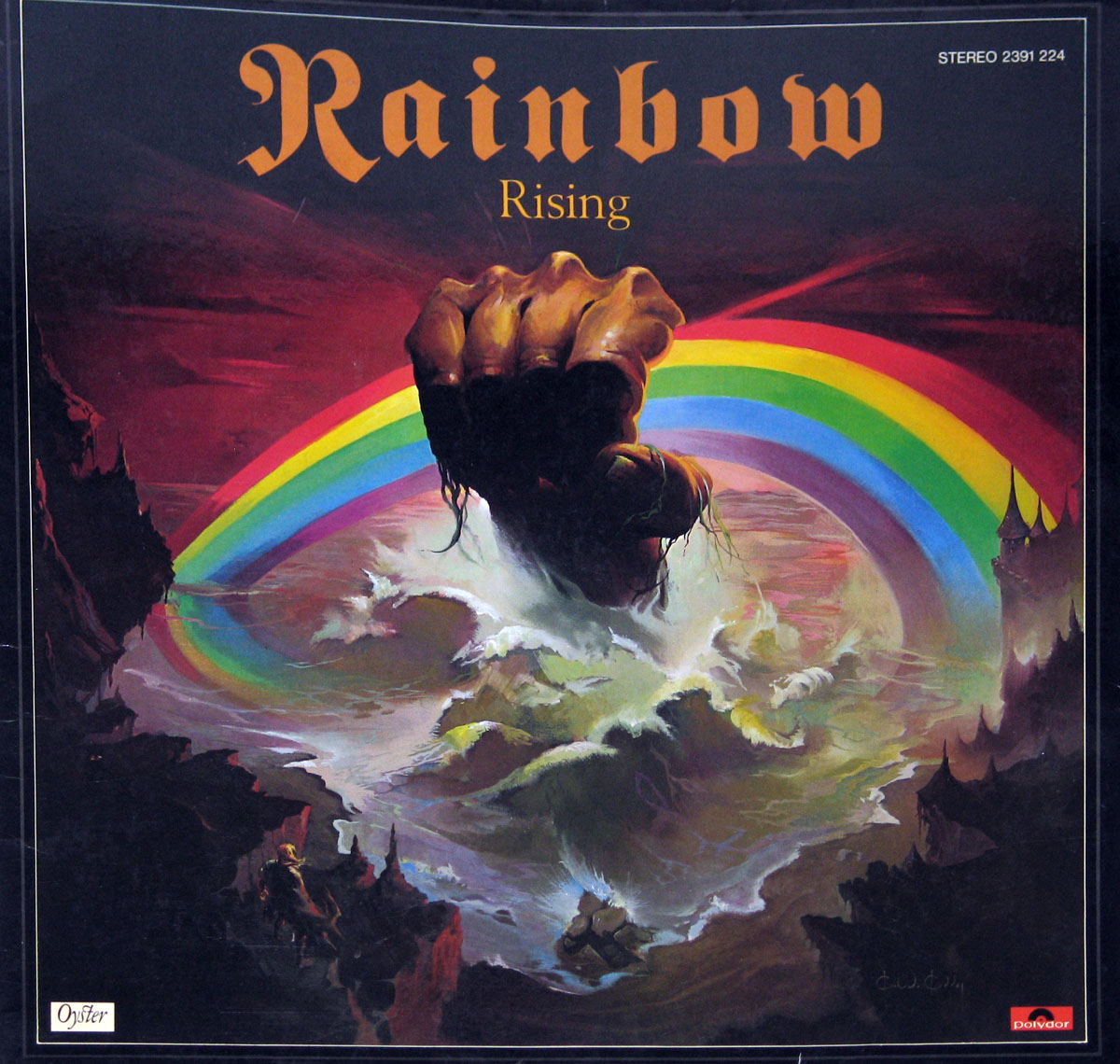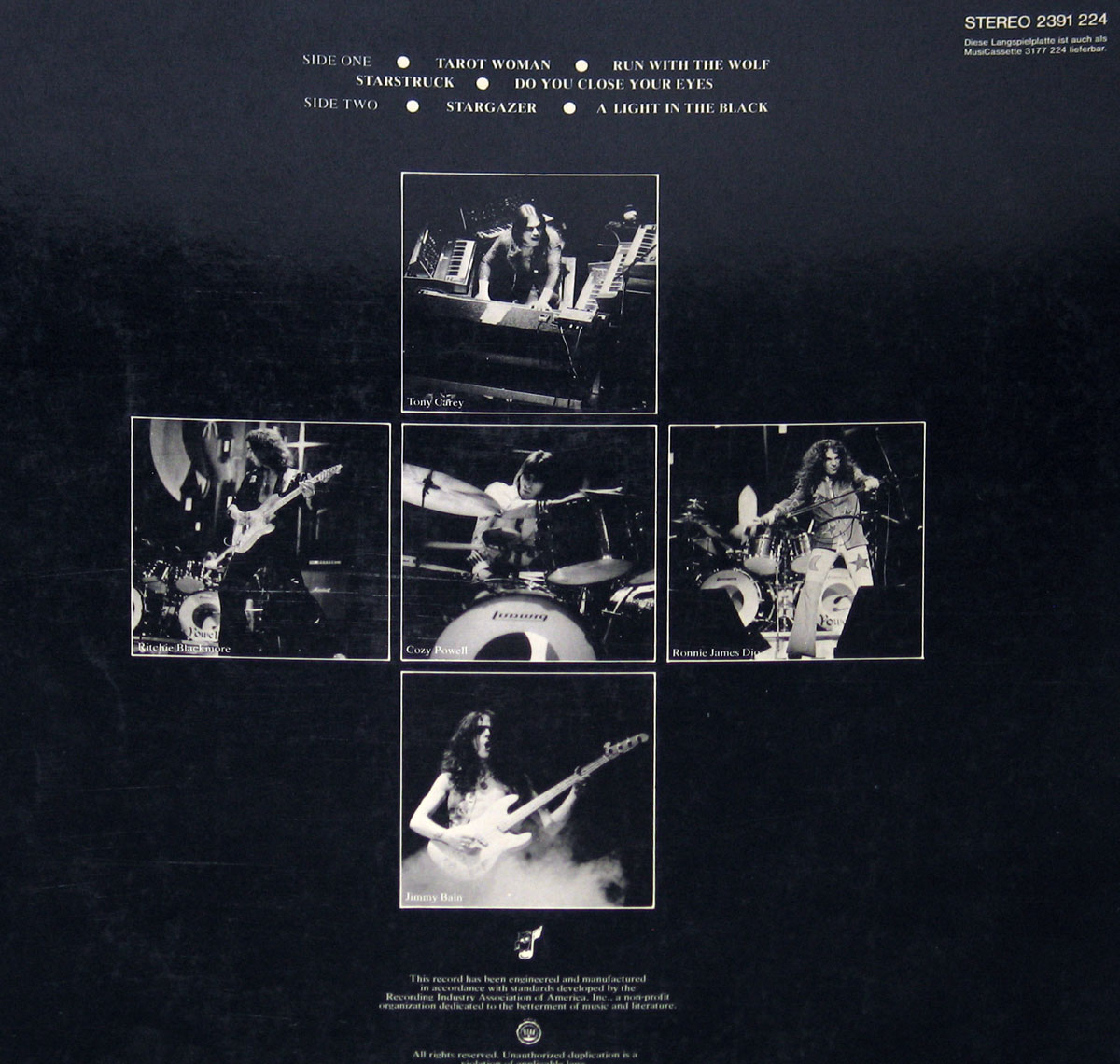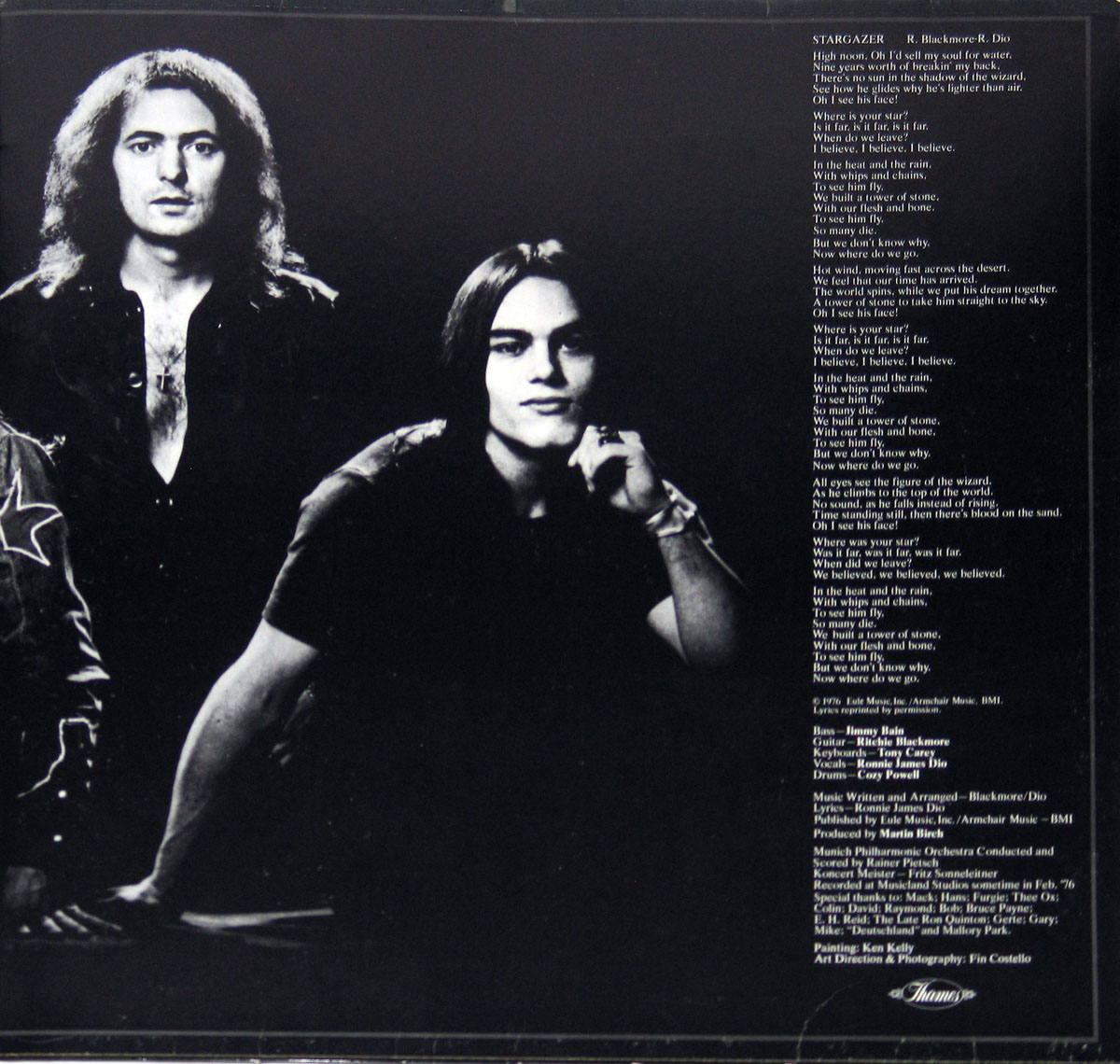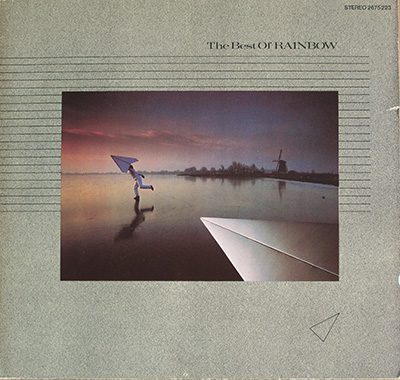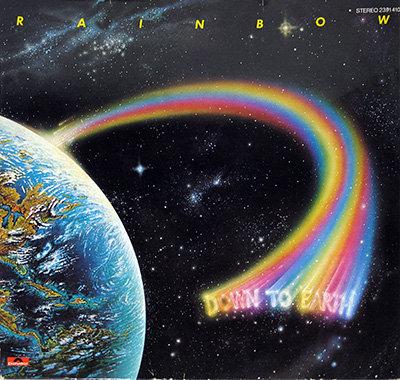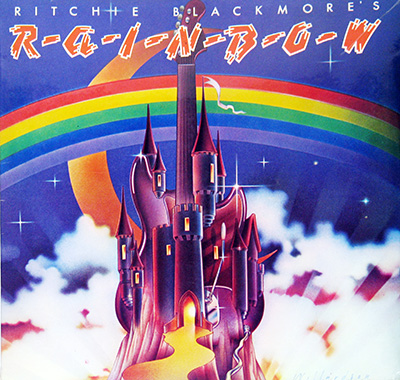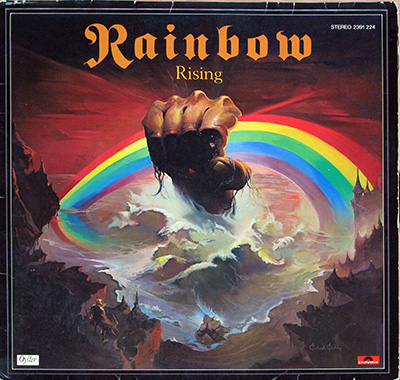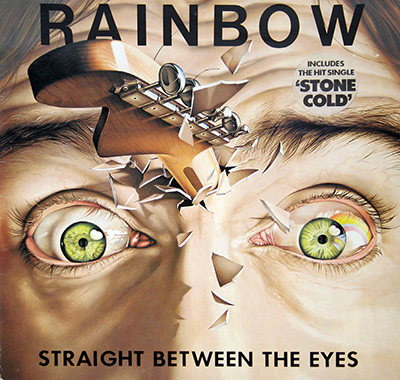Album Description:
Ritchie Blackmore's Rainbow is an iconic band that left an indelible mark on the world of heavy metal. Their second studio album, "Rising", released in 1976, stands as a testament to their musical prowess and creativity. With Ritchie Blackmore at the helm, Rainbow assembled a powerhouse lineup that included the extraordinary vocal talents of Ronnie James Dio, along with Tony Carey on keyboards and Cozy Powell on drums. This formidable combination of musicians created an album that would go on to be hailed as one of the greatest in Rainbow's storied career.
"Rising" is a masterclass in heavy metal, showcasing Ritchie Blackmore's virtuoso guitar skills and his ability to craft powerful, memorable riffs. From the opening track, "Tarot Woman", the album immediately grabs the listener's attention with its thunderous guitar-driven sound. Blackmore's playing is at its peak, effortlessly blending intricate melodies with crushing power chords, displaying his unique ability to create both intricate and aggressive guitar work.
One of the defining aspects of "Rising" is the keyboard wizardry of Tony Carey. His contributions add depth and texture to the album, complementing Blackmore's guitar work perfectly. Whether it's the haunting melodies of "Stargazer" or the driving energy of "A Light in the Black", Carey's keyboard skills elevate the music to another level, creating an atmospheric backdrop that enhances the overall sonic experience.
The rhythm section of "Rising" is equally impressive, with Cozy Powell's thunderous drumming providing a solid foundation for the album's heavy sound. Powell's precise and powerful drumming style is showcased brilliantly on tracks like "Run with the Wolf" and "Do You Close Your Eyes", where he drives the songs forward with relentless energy and precision.
Recorded in Munich in less than a month, "Rising" possesses a raw and organic quality that sets it apart from other albums of the era. The band opted for minimal overdubs, allowing the songs to maintain their live energy and intensity. This approach gives the album a certain authenticity and captures the essence of Rainbow's dynamic live performances.
The production of "Rising" was overseen by the legendary Martin Birch, renowned for his work with Deep Purple and other iconic rock acts. Birch's expertise ensured that the album had a polished and powerful sound while still retaining the raw energy of the band's performance.
"Rising" has become a landmark album in the history of heavy metal. Its influence can be heard in the work of countless bands that followed in Rainbow's footsteps. The album's impact and lasting appeal are a testament to the exceptional musicianship and songwriting prowess of Ritchie Blackmore and his bandmates.
In recognition of its enduring popularity, the "Rising" album is now being released on a 12" vinyl LP format in Austria. This special edition allows fans to experience the album in all its analog glory, with the warmth and richness that only vinyl can provide. It's a chance to rediscover the timeless classics such as "Starstruck", "Do You Close Your Eyes", and the epic masterpiece "Stargazer" in a format that pays homage to the album's original release.
|
Music Genre:
70s Hard Rock Heavy Metal
|
|
Album Production Information:
The album: "Rising" was produced by: Martin Birch
Martin Birch – Producer, Sound Engineer
I first noticed Martin Birch on those early Iron Maiden sleeves—the ones with the typography that felt like a threat. At twelve, I didn’t care about "production value"; I just liked that the guitars didn't sound like mud. He was the man behind the sound mixer, the one who made the snare snap like a dry branch in a cold forest. He was "The Headmaster," and we were all just students of his high-voltage curriculum.
Read more...
Birch didn’t just record noise; he organized aggression. By 1972, he was already wrangling the messy brilliance of Deep Purple’s Machine Head, turning Ian Gillan’s banshee wails into something that didn't just clip the tape but lived inside it. In 1980, he pulled off the ultimate renovation, giving Black Sabbath a much-needed shower and a new spine. Heaven and Hell shouldn't have worked, but Martin polished that Birmingham sludge into something operatic and gleaming. It was a pivot that felt like fate, mostly because he refused to let the mid-range get lazy.
Then came the long, obsessive stretch with Iron Maiden from 1981 to 1992. It was a twelve-year marriage to the fader. From the moment Killers (EMC 3357, for those who care) hit the shelves, the sound was physical. He knew how to let Steve Harris’s bass clatter like a machine gun without drowning out the melody—a sonic miracle that still feels fresh. You can almost smell the ozone and the dust on the Marshall stacks when the needle drops on The Number of the Beast. He stayed until Fear of the Dark, then simply walked away. No victory lap, no bloated memoir. He preferred the hum of the desk to the noise of the crowd, leaving us with nothing but the records and a slight sense of abandonment. But then, when you’ve already captured lightning on tape for twenty years, why bother hanging around for the rain?
|
|
Record Label & Catalognr:
Oyster 2391 224 / DP (O) Limitied
|
|
Packaging:
Gatefold/FOC (Fold Open Cover) Album Cover Design with / photos Rainbow's band incl (Ronnie James Dio and Ritchie Blackmore) on the inside cover pages.
|
|
Media Format:
12" Vinyl Full-Length Stereo Long-Play Gramophone Record
Album weight: 280 gram
|
|
Year & Country:
1976 Made in Austria
|
Band Members and Musicians on: Ritchies Blackmore Rainbow Rising FOC
|
Band-members, Musicians and Performers
- Jimmy Bain
- Jimmy Bain – Bass
Jimmy Bain is one of those bass players I call “quietly essential”: he doesn’t steal the spotlight, he just makes the whole thing hit harder and feel bigger. His lines have that no-nonsense weight that lets the guitars fly and the vocals preach without the bottom end turning to soup. Read more... Jimmy Bain, for me, is a perfect example of how a great bassist can be both glue and engine at the same time—solid timing, fat tone, and just enough bite to keep things from getting polite. Timeline-wise, I always track him from Harlot (early 1970s) into Rainbow (1975–1977), then a long stretch with Dio (1982–1989, plus later returns like 1993–1994 and 2004), with plenty of side quests in between—most famously with Riverdogs band (1990–1993). Jimmy Bain Wiki
- Ritchie Blackmore (Deep Purple)
- Ritchie Blackmore – Guitarist, Songwriter
The guy who made the guitar sound both medieval and radioactive, often in the same solo.
Read more...
Ritchie Blackmore is the sort of name I see on a sleeve and instantly expect sparks: born Richard Hugh Blackmore (1945), he’s an English guitarist who helped hard-rock riffing grow teeth and then politely refused to stop. His era-stamps are basically whole chapters of rock history: Deep Purple (1968–1975, 1984–1993), where the riffs got louder, sharper, and more dramatic; Rainbow (1975–1984, 1993–1997), where he leaned into melody and fantasy like it was a weapon; and Blackmore’s Night (1997–present), where the electric storm calms down into Renaissance-folk textures without losing that unmistakable Blackmore touch. I love that arc: from amp-stacks and arena thunder to lutes-and-candles vibes, like he just swapped dragons for different dragons.
"Blackmore Signature Strats"
I’ve spent too many nights chasing that Blackmore chime. Fender’s Artist Series Strat is a love letter to his ‘70s obsession—Olympic White with a graduated scalloped rosewood board that makes your fingers feel like they’re floating. The electronics are pure Ritchie logic: two Seymour Duncan Quarter Pounds for the bite and a dummy middle pickup. It’s a prop, a plastic decoy for us mortals. Then there’s the Fender Japan ST72-145RB. MIJ builds have a surgical precision, keeping the ‘72 vibe alive for the obsessive collector. We hunt these like lost relics, justifying the cost because a standard neck feels one-dimensional by comparison. It’s a specialized tool for a very specific kind of madness. But then, isn't that the whole point?
- Tony Carey - keyboards
Tony Carey (Full-name: Anthony Lawrence Carey was born in Watsonville, Santa Cruz County, California, United States on 16 Oct 1953.
During 1976 Carey's work on the album included the keyboard introduction to the opening track "Tarot Woman", and an extended keyboard solo on "A Light in the Black", the last cut on the album in "Rising", Ritchie Blackmore's Rainbow . He was 22 years old at that point. During 1977 he works as a keyboards in "On Stage", Ritchie Blackmore's Rainbow . He was 23 years old at that point. His occupation is Keyboard player.
- Ronnie James Dio
- Ronnie James Dio – Vocals
I always loved how he could turn a one-word hook into scripture, then grin and hit you again. Read more... Ronnie James Dio, the pocket-sized volcano whose voice could turn a pub into a cathedral, and whose phrasing hit like a boxer's jab. I watched him climb from Ronnie Dio and the Prophets (1961-1967) and the hard-touring Elf (1967-1975) into Rainbow (1975-1979), where he helped bottle that mix of medieval melody and street-fight hard rock. He rebooted Black Sabbath in two spells-1979-1982 and 1991-1992-then ran his own ship with Dio (1982-1991; 1993-2010), delivering anthems like "Holy Diver" without ever sounding cute. Late in the game he returned with the Sabbath lineup as Heaven & Hell (2006-2010), still singing on stage like the lights might go out mid-chorus.
- Cozy Powell - Drums
- Cozy Powell – Drums
Cozy Powell is the kind of drummer I file under “human avalanche”: big hands, bigger feel, and a groove that hits like a freight train in leather pants. Read more... Cozy Powell, for me, is the textbook example of “power that still swings”—he can be thunderous without turning stiff, flashy without turning messy, and he always leaves space for the riff to breathe. When I hear him, I hear commitment: the snare cracks, the toms roll like incoming weather, and the whole band suddenly sounds like it got upgraded to arena mode. Timeline-wise, I always map his career in loud chapters—The Jeff Beck Group (1970–1972), Rainbow (1975–1980), Michael Schenker Group (1980–1982), Whitesnake (1982–1985), Emerson, Lake & Powell (1985–1986), Black Sabbath (1988–1991, 1994–1995), and the Brian May Band (1991–1992, 1993–1994, 1998).
|
